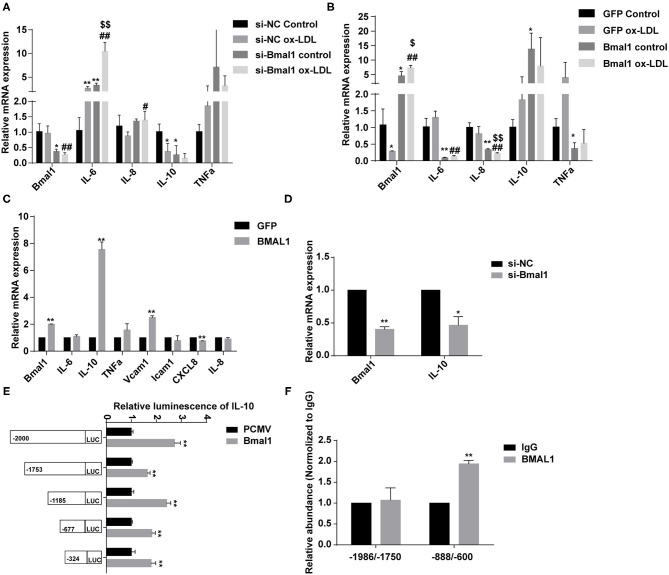Figure 3.
Bmal1 represses inflammation by inhibiting the lipid uptake and transcriptionally regulating the IL-10 expression. (A) Relative mRNA expression of genes involved in inflammation in human umbilical vein endothelial cells (HUVECs) which had been transfected with si-NC or si-Bmal1 with or without the addition of ox-LDL. Data are presented as mean ± SEM (one-way ANOVA with post-hoc Tukey test). *p < 0.05 and **p < 0.01 vs. si-NC control; #p < 0.05 and ##p < 0.01 vs. si-NC ox-LDL; $$p < 0.01 vs. si-Bmal1 control. (B) Relative mRNA expression of genes involved in inflammation in HUVECs which had been transfected with adenoviruses coding for AdGFP or AdBmal1 with or without the addition of ox-LDL. Data are presented as mean ± SEM (one-way ANOVA with post-hoc Tukey test). *p < 0.05 and **p < 0.01 vs. GFP control; ##p < 0.01 vs. GFP ox-LDL; $p < 0.05 and $$p < 0.01 vs. Bmal1 control. (C) Relative mRNA expression of genes involved in inflammation in HUVECs which had been transfected with adenoviruses coding for AdGFP or AdBmal1. Data are presented as mean ± SEM (unpaired t-test). **p < 0.01 Bmal1 vs. GFP. (D) Relative mRNA expression of Bmal1 and IL-10 in HUVECs which had been transfected with Bmal1 siRNA or si-NC. Data are presented as mean ± SEM (unpaired t-test). *p < 0.05 and **p < 0.01 si-Bmal1 vs. si-NC. (E) Luciferase reporter constructs were created containing the truncated (−2,000, −1,753, −1,185, −677, and −324) versions of the IL-10 promoter. The luciferase reporter constructs were co-transfected with Bmal1 overexpression vector or with the control vector into HEK293T cells, and luciferase activity was evaluated 24 h later. Data are presented as mean ± SEM (unpaired t-test). **p < 0.01 Bmal1 vs. PCMV. (F) ChIP assay conducted in HUVECs with anti-BMAL1 or IgG antibody. qRT-PCR analysis was performed with primer sequences around Bmal1-binding E-box elements in the IL-10 promoter. Data are presented as mean ± SEM (unpaired t-test). **p < 0.01 BMAL1 vs. IgG. Each expreiment was repeated 3 independent times.

